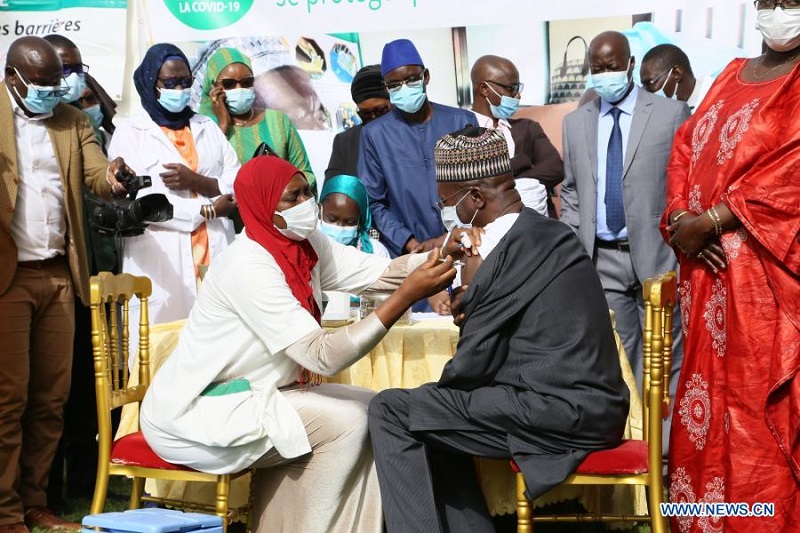Timely vaccine arrivals in Africa show China honoring its commitment to global COVID-19 vaccination

Former Senegalese Prime Minister Souleymane Ndene Ndiaye receives a dose of COVID-19 vaccine provided by Chinese firm Sinopharm in Dakar, Senegal on Feb. 23, 2021. Senegal on Tuesday officially began the first phase of COVID-19 vaccination, taking a new step in the crusade against the pandemic. Senegalese Minister of Health and Social Action Abdoulaye Diouf Sarr received the first dose of COVID-19 vaccine in front of the press at his ministry, which symbolized the starting point of Senegal's vaccination campaign. [Xinhua/Xing Jianqiao]
NAIROBI -- With the timely arrival of China's Sinopharm vaccine, Senegal on Tuesday officially began the first phase of its COVID-19 vaccination campaign, taking one step further in its fight against the pandemic.
The delivery once again showed not only the solid friendship between China and Africa, but also China's honoring of its commitment to making Chinese COVID-19 vaccines a "global public good" accessible and affordable to people around the world.
During the Extraordinary China-Africa Summit on Solidarity against COVID-19 held last year, China pledged that African countries will be "among the first to benefit" from Chinese vaccines.
It has walked the talk indeed -- China has donated to Zimbabwe a batch of Sinopharm vaccine, and will offer another batch soon. Other African countries such as Equatorial Guinea, Egypt and Morocco have also received Chinese vaccines which enabled them to launch their vaccination campaigns.
So far, China has provided vaccine assistance to 53 developing countries in need, and exported vaccines to 22 countries. It has also decided to provide 10 million vaccine doses to multilateral vaccine alliance COVAX to meet the urgent needs of developing countries, many of which are in Africa.
"These vaccines are certainly providing a new light of positivity for the people of Zimbabwe in these tough times ... a light at the end of a dark tunnel," said Zimbabwean President Emmerson Mnangagwa.
In fact, China, a country that firmly believes that solidarity and cooperation is the most powerful weapon against the virus, has been fulfilling its responsibilities as a major country and fighting shoulder to shoulder with African countries against the common threat facing mankind ever since the outbreak.
Apart from delivering anti-epidemic materials and sending medical teams to African countries, China has also become the biggest helper among the Group of 20 in terms of relieving African debt. By the end of 2020, it had signed debt service suspension agreements with 12 African countries, and reduced or waived the interest-free loans of 15 African nations.
As Equatorial Guinean President Teodoro Obiang Nguema Mbasogo put it, China's longstanding support to Africa's fight against the pandemic is a testament to the friendship between the two peoples.
Viruses know no borders. Leaving the world's least developed areas unvaccinated will inevitably perpetuate more infections and deaths across the world, and prolong the global fight against the pandemic. Sadly, it is happening -- despite efforts by countries like China, there is still a huge disparity in global vaccine distribution as some rich countries are hoarding vaccines.
According to Duke University's Global Health Innovation Center, as of mid-January, high-income countries, which represent only 16 percent of the world's population, had taken 60 percent of available doses.
The world faces a "catastrophic moral failure" because of unequal COVID-19 vaccine policies, World Health Organization Director-General Tedros Adhanom Ghebreyesus has warned, adding it is not fair for younger, healthy people in richer countries to get injections before vulnerable people in poorer ones.
Vaccination is not a race among countries, but rather a race against time. As COVID-19 infections and deaths are still surging in Africa and other less developed areas, it is urgent for the international community to come together to reject vaccine nationalism and promote fair and equitable distribution of vaccines, so as to make them accessible and affordable to all.
























